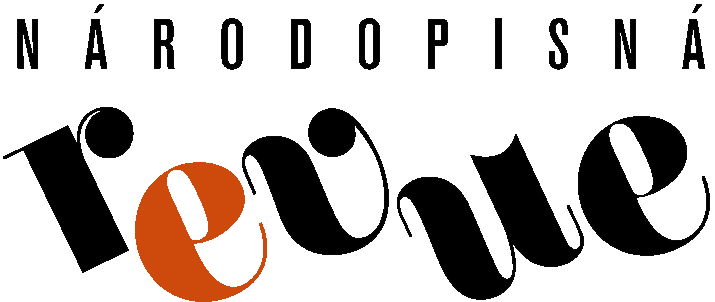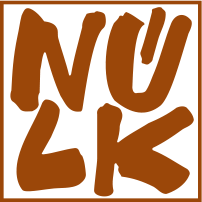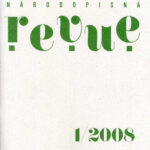Journal of Ethnography 1/2008 outlines the migration and the ethnic issues. Alexandra Bitušíková chose the theme of transnational migration (Transnational Migration: Research Possibilities within the Central-European Space). Pavel Havránek (Czechs in Caucasus, a Brief History of the Settled Area) and Miloš Luković (Bohumil Bouček ́s Medical Mission in Montenegro between 1875 and 1876 from the Ethnological and Cultural and Historical Point of View) chose the transnational migration as their theme. Zdeněk Uherek and Tereza Pojarová presented a part of the voluminous research concerning the contemporary Romany question (Positions and Opinions of Romany Society Representatives on Selected Issues concering the Community Conflicts).
The text Change of Tradition (author Alena Dunajová) deals with the every-day life of Romanian Slovaks in former Transylvania). Section Review remembers the personality of ethnologist Karel Fojtík (1918–1999). Social Chronicle remembers the anniversaries of the Slovak folklorist Soňa Burlasová (born 1927), ethnologist Alena Plessingerová (born 1928) and that of Miloslav Brtník (born 1928) – musician, folklore collector and an important organizer of folklore movement in the region of Horácko. In other regular columns, the reports of conferences, exhibitions and other professional branch activities and the reviews of new book editions are published.
Transnational migration: Research Possibilities in Conditions of the Central-European Area
The paper deals with the anthropological study of transnationalism that is a new phenomenon in the post-socialist countries in Central Europe, and a new perspective research topic. It brings a brief overview of the most used definitions of transnationalism. It focuses on the processes of transnational migration and the place of transnational migrants in the global world. With an example of the transnational migrants from Slovakia working in Brussels, it demonstrates what makes a migrant transnational and different from a „traditional“migrant. The study mentions two flows of transnational migrants from Central Europe – the transnational professionals and the workers in non-qualified jobs. It also emphasises the importance of studying the increasing transnational migration to Central Europe (mainly from Eastern Europe) and its consequences for the changing structure and diversity of the population.
Czechs in Caucasus, a Brief History of the Settled Area
The emigration of Czech ethnic group to the area of north-eastern Caucasus in Russia ranked among one of three main colonizing streams heading east from Bohemia and Moravia in the course of the 1860s. Bedřich Heyduk, who acted as the main agronomist in the Black-Sea Governorate, played the leading role. The colonists founded some villages, especially in the close vicinity to the seaport town of Novorossiysk. Even after 140 years full of tsarist country’s russificating policy, wars, Bolsheviks ́ government and everything related to the above, the Russian Czechs have maintained their national awareness and do no forget the roots of their ancestors. The Czech Republic is giving the assistance as well – it supports the compatriots living abroad in many aspects, shall it concern financial subsidies or ensuring the lessons of Czech language.
Bohumil Bouček ́s Medical Mission in Montenegro between 1875 and 1876 from the Ethnological and Cultural and Historical Point of View
Bohumil Bouček (1850–1926) is known especially as founder of the spa in Poděbrady. As the young physician, he spent six months in medical mission in Šavnik in Montenegro, where the Austrian-Hungarian Government posted him during the so-called Herzegovina Uprising 1875–1876. In his letters, published at that time, as well as in the book “Among wounded Montenegrians, years 1875–6” he depicted the course and some details of the anti-Turkish uprising, not excepting the contacts with other Czechs and foreigners working in the region. He described the treatment of the wounded rebels and local people and he recorded the every-day life in families (way of livehood, food preparation, hygienic habits, various customs and festivities, folklore tradition, position of popes in the society etc.). His records represent both the “little” history of the uprising and the source for etnologists, physicians and scientists from other scientific branches.
Attitudes and Opinions of Roma Social Representatives to Selected Issues Relating to Community Conflicts
The contribution proceeds on the analysis of responses by Roma leading employees of 30 institutions dealing with social work, consultancy, cultural activity and political activities. The data have been obtained within the solution of the international project called Peace-Com, focused on the community conflicts in Europe. The text concentrates on determination of the term “community conflict” and shows, which Roma leading personalities look for the beginnings and causes of those conflicts in the Czech countries. The research has shown a quite significant co-operation of organisations cooperating with Roma with state administration and local self-governments, non-governmental and non-profit-making organizations and international organizations as well as a big heterogeneity in looking for causes and beginnings of community conflicts and a small interconnection of Roma organization among each other. The research has also confirmed that the Roma penetrate the political sphere to a quite low extent, they have, however, their allies there. The Roma elites concentrate rather on social works ad cultural activities. The research concerned just the organizations and only the leading Roma representatives were interviewed. It does not represent the opinions and attitudes in Roma communities generally.



